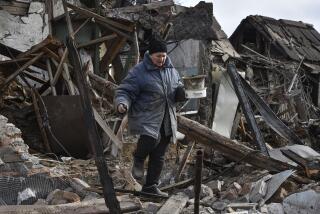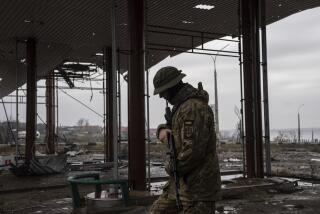Defense Chief Sees Little Air Strike Risk : Balkans: Perry is confident that Serbian weapons pose only a minimal threat to American planes. Bosnian Serbs resume turning in their big guns.
- Share via
WASHINGTON — As the United States prepares to take part in possible air strikes over Bosnia-Herzegovina, Secretary of Defense William J. Perry asserted Sunday that “the risks will be minimal” that any American warplane would be shot down or any pilot taken prisoner.
“We’ve had airplanes flying air cover over Bosnia for some time now,” Perry said in an ABC television interview. “. . . We have a very high-performance aircraft, the best in the world, over there, and there is a minimal air-defense system that we’re going against.”
Perry’s confidence was echoed by Senate Minority Leader Bob Dole (R-Kan.), who said in a separate TV interview on NBC’s “Meet the Press” that “we’re not talking about the (former) Soviet (Union). We’re talking about the Serbs.”
The United States is planning to participate in the air strikes as part of a NATO operation that could begin one week from today if the guns around Sarajevo are not pulled back to at least 12 miles from the city’s downtown area.
A shaky truce prevailed in Sarajevo on Sunday and Bosnian Serbs besieging the city resumed turning in some of their big guns, the Associated Press reported.
The U.S. Embassy spent the day packing the families of 35 diplomats out of Belgrade, capital of Yugoslavia. Dutch, British and German officials also have urged their citizens to leave the country.
The evacuation of dependents was a precaution against Serbian reprisals in the event of air strikes. Many in the Serb-dominated Yugoslav government and army support the Bosnian Serbs.
Perry, appearing on “This Week With David Brinkley” in his first television interview as defense secretary, described in detail what would happen to Bosnian Serb artillery if it tried to fire during any NATO air strike.
“First of all, if the shells come in, we can deploy artillery-locating radars which will backtrack the position of the guns,” he said. “And, secondly, the air-strike aircraft we have are the most modern and the most precise in the world and with the best sensors.
”. . . From the time of the impact (of the artillery on the ground), it’s a matter of seconds to get the information, the coordinates, to an airplane. Then it’s a question of where is the airplane relative to the gun? . . . We are maintaining continuous air cover. So if an airplane is near that area, it can be there in a matter of a minute or two. . . .
“No military operation is without risk,” Perry acknowledged. “. . . But the risks, I believe, are minimal in this operation.”
If the first air strikes didn’t work, the defense secretary said, the Clinton Administration would consider other military options, including increasing the intensity of air strikes and extending them to areas beyond Sarajevo.
Perry emphasized, “We are not looking at options which involve the commitment of U.S. ground forces to the area.”
However, the United States has pledged to provide thousands of peacekeeping troops to help enforce any peace plan agreed to by all warring parties.
The Associated Press reported from Sarajevo that U.N. officials over the weekend accepted a compromise plan under which the Bosnian Serbs besieging the city will be allowed to turn in their heavy weapons at U.N.-monitored Serbian bases, rather than at the Sarajevo airport as originally planned.
The Bosnian army objected. “Those weapons can be returned to combat positions very fast,” Bosnian Gen. Fikret Muslimovic said.
“I am afraid that such an approach and an attempt to appease the aggression further would bring a hardening of the Serbian position,” said Haris Silajdzic, the Bosnian prime minister.
The Bosnian Serbs had earlier insisted that they would surrender their guns only if the Muslim-dominated government’s infantry abandoned its front-line positions. But after heavy lobbying by U.N. officials, the Serbs turned over 13 heavy weapons on Sunday, bringing the total to 36 guns: 26 Serbian and 10 Muslim.
The Bosnian Serbs are believed to have at least 500 heavy weapons. The Bosnian army has perhaps a tenth that number.
Also Sunday, U.N. officials in Sarajevo made statements suggesting that the NATO deadline for lifting the siege of Sarajevo is not set in stone, according to a report in the Washington Post.
The officials said they told Bosnian Serbs that they were not necessarily concerned that some Serbian guns might remain pointing at the capital after the Feb. 21 deadline. The officials argued that altering terms of the ultimatum is part of the process of lifting the siege by peaceful means.
But U.S. and NATO officials have remained adamant about enforcing the ultimatum.
In Zagreb on Sunday, U.S. Adm. Jeremy Boorda, NATO’s southern flank commander, met with Lt. Gen. Michael Rose, commander of U.N. peacekeepers in Bosnia, and Yasushi Akashi, special U.N. representative in the former Yugoslav federation, to coordinate action, the Associated Press said.
U.N. Secretary General Boutros Boutros-Ghali has given Akashi the authority to order air strikes. Rose will report on whether Bosnian Serb guns still threaten Sarajevo. Boorda commands the planes that would carry out any bombing.
More to Read
Get the L.A. Times Politics newsletter
Deeply reported insights into legislation, politics and policy from Sacramento, Washington and beyond. In your inbox twice per week.
You may occasionally receive promotional content from the Los Angeles Times.










